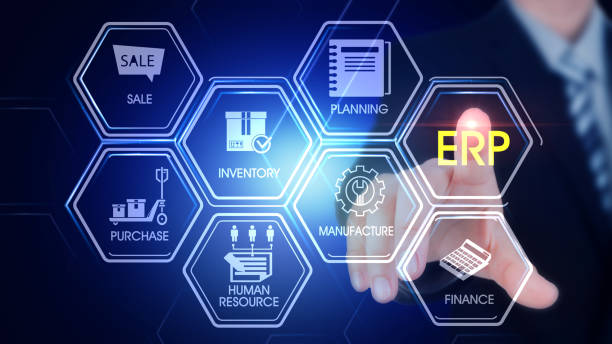What Is an ERP Solution?
An Enterprise Resource Planning (ERP) solution is an integrated software system that centralizes data and business processes across various departments, including finance, human resources, supply chain, manufacturing, and customer relationship management. ERP solutions facilitate seamless data sharing and communication, enabling organizations to make faster, data-driven decisions and eliminate operational inefficiencies.
Key Features of ERP Solutions
Modern ERP systems are feature-rich platforms that offer a comprehensive suite of tools tailored to diverse business needs:
-
Centralized Database: Provides real-time data access across departments.
-
Modular Architecture: Allows businesses to implement only the necessary modules.
-
Automation Capabilities: Streamlines repetitive processes such as invoicing, payroll, and procurement.
-
Reporting & Analytics: Provides deep insights through dashboards, forecasts, and custom reports.
-
Integration with Third-party Apps: Supports APIs and connectors for seamless third-party tool integration.
-
Mobile Accessibility: Ensures users can access data and complete tasks remotely.
Top Benefits of ERP Solutions for Businesses
Implementing an ERP system yields several strategic benefits that can transform how organizations operate:
1. Enhanced Productivity
By automating core business processes and reducing manual tasks, ERP software increases productivity across departments. Employees can focus on value-adding activities instead of repetitive administrative duties.
2. Improved Data Accuracy
ERP systems reduce data duplication and human errors by providing a single source of truth. This ensures consistency in business operations, especially in finance and inventory management.
3. Real-time Decision Making
With real-time dashboards and analytics, decision-makers have instant access to key performance indicators (KPIs), enabling faster and more informed choices.
4. Scalability and Flexibility
Modern ERP solutions are built to scale with business growth. Whether expanding to new regions or introducing new product lines, ERP platforms adapt to the evolving needs of the organization.
5. Regulatory Compliance
ERP systems often come equipped with compliance management tools that help organizations adhere to industry standards, tax regulations, and auditing requirements.
Types of ERP Deployment Models
Choosing the right deployment model is critical for maximizing ERP benefits:
1. On-Premise ERP
Installed locally on the company’s servers, on-premise ERP offers complete control over the system and data but requires significant upfront investment and IT resources.
2. Cloud-based ERP
Hosted on the vendor’s servers and accessible via the internet, cloud ERP solutions are cost-effective, scalable, and offer seamless updates and remote access.
3. Hybrid ERP
Combines the best of both on-premise and cloud systems, hybrid ERP models provide flexibility for businesses with unique needs.
Industry-Specific ERP Solutions
Some ERP vendors offer tailored ERP systems for specific industries to address unique challenges and regulatory requirements:
-
Manufacturing ERP: Focuses on production planning, quality control, and shop floor management.
-
Retail ERP: Includes POS systems, customer analytics, and supply chain optimization.
-
Healthcare ERP: Manages patient records, billing, compliance, and inventory of medical supplies.
-
Construction ERP: Tracks project timelines, budgeting, contractor coordination, and site management.
-
Education ERP: Manages student records, admissions, grading, and finance systems.

Leading ERP Vendors in 2025
Numerous vendors offer reliable ERP systems. The top ERP providers known for robust features and scalable solutions include:
-
SAP ERP: Ideal for large enterprises; known for deep functionality and customization.
-
Oracle NetSuite: Popular cloud-based ERP for mid-sized businesses.
-
Microsoft Dynamics 365: A versatile ERP solution with native integration into the Microsoft ecosystem.
-
Infor CloudSuite: Focuses on industry-specific cloud ERP applications.
-
Odoo: A modular, open-source ERP solution suitable for small to medium-sized enterprises.
How to Choose the Right ERP Solution
1. Identify Business Needs
Begin by mapping existing workflows and identifying pain points. Understand which departments will benefit most and what specific features are needed.
2. Budget Assessment
Set a realistic budget covering licensing, implementation, training, and support. Cloud ERP solutions often offer a lower total cost of ownership (TCO) than on-premise systems.
3. Vendor Reputation
Look for vendors with proven track records in your industry. Check client reviews, customer support capabilities, and service level agreements (SLAs).
4. Customization and Integration
Ensure the ERP can integrate with existing tools and allows for customization without excessive development time or costs.
5. Training and Change Management
Choose a solution that offers comprehensive user training, onboarding, and change management support to drive adoption and minimize disruptions.
Common Challenges in ERP Implementation
Despite the numerous benefits, ERP implementation can be complex and risky without careful planning:
-
Resistance to Change: Employees may resist new processes. Clear communication and involvement are key.
-
Data Migration Issues: Transferring existing data to the new system must be handled meticulously.
-
Customization Overload: Too many customizations can complicate future upgrades and maintenance.
-
Underestimating Costs: Hidden costs in training, integration, and support can affect the budget.
-
Vendor Lock-in: Ensure exit strategies are in place in case the partnership fails.
ERP Trends to Watch in 2025
The ERP landscape is evolving rapidly, with emerging technologies reshaping functionalities:
-
Artificial Intelligence (AI): AI-driven analytics and intelligent automation are now embedded into ERP systems.
-
IoT Integration: Real-time data from connected devices enhances supply chain visibility.
-
Blockchain: Enhances security and transparency in multi-party transactions.
-
Self-service BI Tools: Empowers non-technical users to generate reports and perform data analysis.
-
Hyperautomation: Combines AI, RPA, and machine learning to automate end-to-end business processes.
Final Thoughts: The Strategic Importance of ERP Solutions
A robust ERP solution serves as the digital backbone of modern enterprises. It unifies core business processes, reduces redundancy, enhances collaboration, and enables rapid response to market changes. As businesses increasingly prioritize agility and efficiency, ERP systems have become indispensable tools for sustained growth and competitive advantage.




Pingback: How AI is Changing Human Resource Management